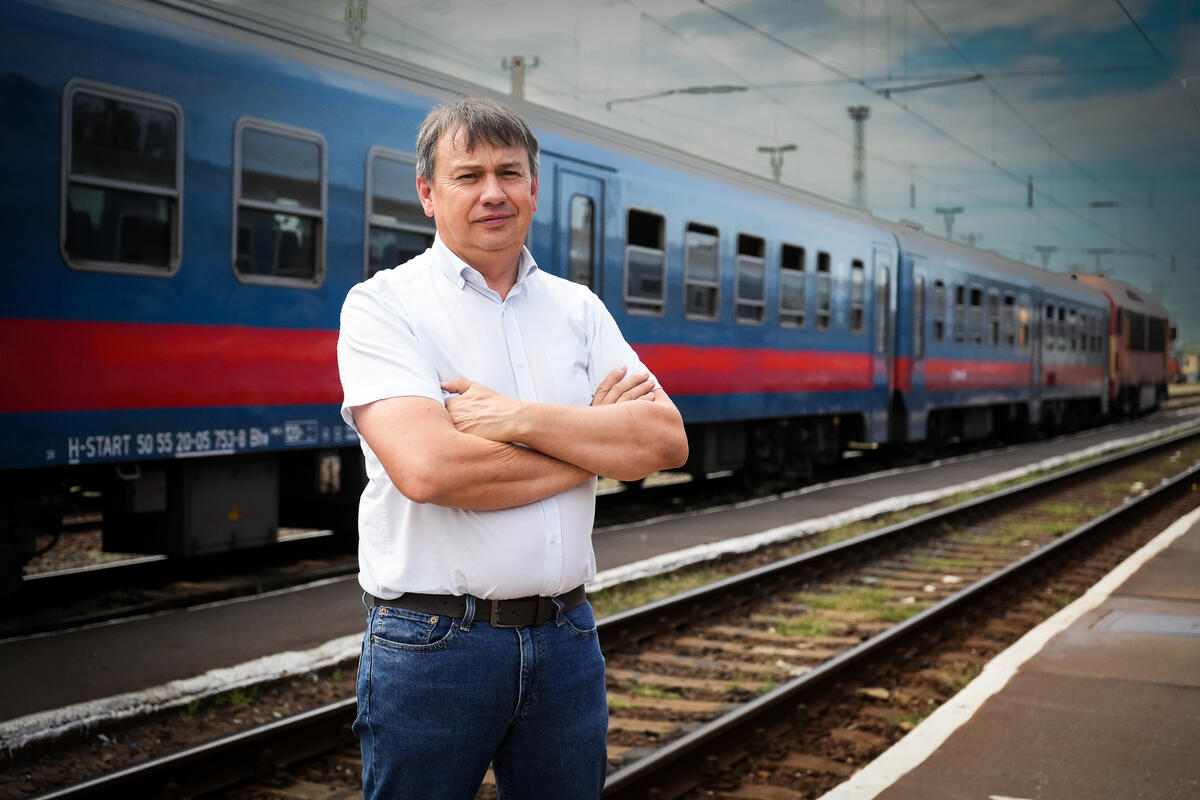Afghan refugees offer pitch-perfect camp for hosts
Afghan refugees offer pitch-perfect camp for hosts

HAVELIAN, Pakistan, November 21 (UNHCR) - For more than 10 years, Niamat Sulman Kheil lived in refugee camps in Mianwali and Haripur in northern Pakistan. He never thought that one day, the tables would turn and he would end up providing a roof for his hosts.
But when the October 8 earthquake hit, he wasted no time in making his pitch. The Afghan refugee approached UNHCR and the local authorities to offer his expertise in erecting tents. The result was Banda Shahib Khan camp, the first relief camp run by civil authorities in the earthquake-affected north. Over 2,500 people are already living there; many more are arriving every day.
"The newcomers didn't know how to open or pitch the tents. They were very slow, completing about 10 tents a day," says UNHCR field assistant Farkhanda Anwar. "In comparison, the Afghans are very experienced and fast."
"It's difficult work, not the work of one man. You need six to seven people," says Sulman Kheil, who was born in Baghlan province in northern Afghanistan. His former neighbour in the Mianwali camp, a man called Gulamjan, looms nearby. The seven-foot giant, who originates from Kabul, is a pillar of strength for the team, holding up the tent pole while others hammer stakes into the ground and secure the ropes.
The team works at lightning speed. Within minutes, a new tent is up. The men swing their tools over their shoulders and move on to the next plot.
Erecting 50 to 60 tents a day, Sulman Kheil and his team of 16 Afghan refugees have helped to house earthquake survivors who have come to Banda Shahib Khan camp from Balakot, Batagram, Muzaffarabad and even the Kaghan and Allai valleys further north.
Mohammad Jan, 43, arrived with his family over a week ago from Balakot. "Everything has been destroyed in our area and there's nothing left behind for us," he said. "There was no other option but to move to a safer area where we can spend winter."
In addition to shelter, winterization is another priority as the first snows appear on the nearby mountains. This is another area the Afghan refugees can help with, given their long experience of keeping warm in UNHCR tents through the winter.
"When I pitch a tent, I make sure the two-fly top is kept apart so that the air between the layers can provide insulation," says Sulman Kheil. "To keep cold air from coming in, you can build about 2 feet of mud wall around the base of the tent, and lay a plastic sheet on the ground."
Captain Munir Azam, the District Coordination Officer of Abbottabad district, which runs the camp with Pakistan's Chief Commissionerate for Afghan Refugees, acknowledges: "We're not experts in running camps. We need all the help and advice we can get."
He adds, "I am very thankful to UNHCR, which gave us 100 tents at very short notice then followed up with 300 more. I don't want to turn people away simply because there's no shelter. Nobody should sleep without quilts and mattresses, so I went out and bought more from the market last night."
Besides the tents, some families also sleep in iron-sheet cabins donated by Lion's Club International. As the first relief camp run by civil authorities - most camps are run by the military and some by non-governmental organizations - Banda Shahib Khan camp boasts a dispensary staffed by four doctors and two specialists, as well as a trauma centre and two schools. Water points, latrines and bathrooms are in place and laundry areas are being planned. The local authorities are providing cooked food until a communal kitchen can be built.
There are plans to expand the camp to host up to 20,000 people. "After we're done here, we'll replace some of the flimsier tents. Then we'll start working on the new area," Sulman Kheil says purposefully, pointing to a stretch of land nearby.
He welcomes the extra work: "Even though Afghanistan is my country, my heart is here in Pakistan. It's my duty to help the earthquake survivors."
Banda Shahib Khan is one of 20 camps in Pakistan's quake zone where UNHCR is currently supporting the Pakistan government and military in site planning and coordinating the provision of basic services like water, sanitation, health care and education.
By Asif Shahzad and Vivian Tan in Havelian, Pakistan









